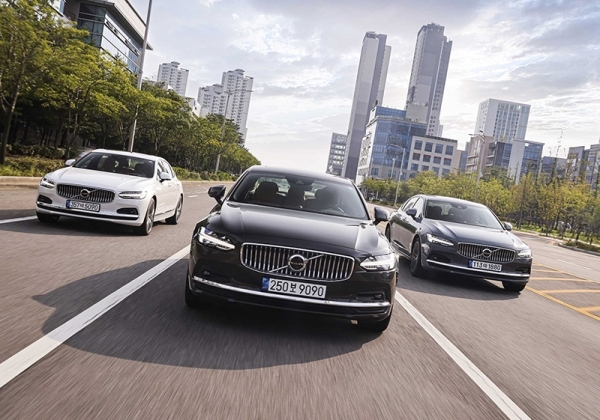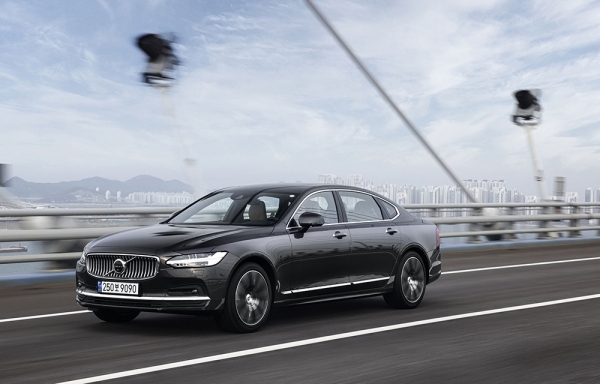[Behind the Wheel] Volvo S90 taps into Korea’s cutthroat executive car market
Swedish carmaker takes aim at German rivals, Benz, BMW, Audi, with longer, lower-priced sedan
By Shin Ji-hyePublished : Oct. 11, 2020 - 12:01

With the launch of the facelifted luxury sedan S90 in Korea, Swedish automaker Volvo has thrown down the gauntlet to the German automotive brands that dominate the nation’s executive car market.
In the executive car market, or E-segment, Koreans are avid buyers of German brands, such as the Mercedes-Benz E-Class, BMW 5-Series and Audi A6. The three models have a combined 77 percent share in the nation’s luxury E-segment market.
Volvo, which boasts strong sales in sport utility cars but has been in a somewhat awkward position in the E-segment, is now gearing up to steal some of its German rivals’ market share.
Last month, it launched the upgraded S90, a return after four years off the market, with a longer length, on top of its widely accepted image of being the “safest” car.
The Korea Herald test-drove the Volvo S90 on a 100-kilometer round trip between Seoul and Incheon.
From the outside, the new sedan has minor changes in design. The biggest difference is its longer length.
The wheelbase increased 120 millimeters compared to the previous model. The increased wheelbase improved the ride quality of the rear seat, making it comparable to a chauffeur-driven car. S90’s rear seat has more legroom than its three German rivals. Even when sitting cross-legged, it was still spacious. The seats do not fold down completely flat but it was still very comfortable.

Another new feature about the S90 is its eco-friendly powertrain. The new S90 is the first vehicle after Volvo declared in July that it would switch to hybrid instead of selling pure diesel and gasoline cars in all models. With a 48-volt mild-hybrid system, the engine started with very little vibration and little noise.
Even when driving at 100 kilometers, the noise from the car body was not loud. The ride was composed and calm rather than a sporty, dynamic feel. This car has a maximum output of 250 horsepower and a maximum torque of 35.7 kilogram-meters.
The S90 is equipped with Pilot Assist II, which is the second level of autonomous driving. When activating the assistant system via steering wheel button, the car automatically sped up and down while maintaining a safe distance with the vehicle ahead. Without having to press the brakes or accelerator pedal, it moved at the speed of the car ahead. When a vehicle that was driving in the next lane jumped in front, it slowed down on its own.
A new safety option called a Care Key in orange color was adopted. Only the key owner can set the maximum speed between 50 and 180 Kilometers per hour to prevent accidents caused by speeding, Volvo Korea said. Starting with the new S90, it will be used in all Volvo cars starting with the 2021 model.
Volvo again collaborates with British premium audio firm Bowers & Wilkins for the new S90. The audio system has upgraded amplifiers and added jazz club mode. With noise cancellations that eliminate indoor noise, it felt like listening to music in a studio while driving.
With all the upgrades, Volvo raised only 1 million won ($860) for the S90 to 66.9 million won, compared to rivals Mercedes-Benz E300 model that costs 63 million won to 77 million won and the BMW 530i model that costs 71 million won to 76 million won.
Volvo’s ambitious plan seems to have been somewhat successful. So far, more than 3,200 units were sold and consumers have to wait another six months to buy this car.
By Shin Ji-hye (shinjh@heraldcorp.com)








![[Hello India] Hyundai Motor vows to boost 'clean mobility' in India](http://res.heraldm.com/phpwas/restmb_idxmake.php?idx=644&simg=/content/image/2024/04/25/20240425050672_0.jpg&u=)










